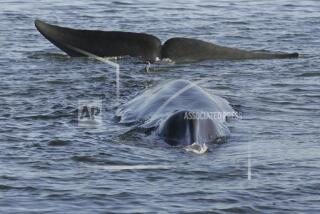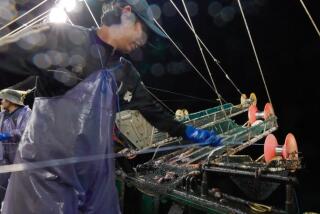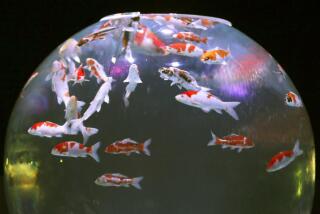Japan Holds Its Own in Whaling Debate
- Share via
TOKYO — Japan and other pro-whaling nations successfully frustrated a move this week to create a whale sanctuary in the Pacific stretching from Australia to Chile, but environmentalists say it was only the first round.
In dealing with Japan, “tenacity is the word,” said Allan Thornton, chairman of the Environmental Investigation Agency, a private international group. “I predict within two to three years, the South Pacific resolution will pass.”
Members of the International Whaling Commission in Adelaide, Australia, voted 18-11 in favor of the sanctuary Tuesday. Passage, however, requires a two-thirds majority.
Japanese negotiators have long argued that the world doesn’t need another sanctuary. Many whale species are overpopulated, they say, and Japan’s fleets should be allowed to resume commercial whaling.
“Minke whales in the Antarctic are the cockroaches of the sea,” Masayuki Komatsu, Japan’s leading government fisheries negotiator, said in an interview late last year. “They should be harvested.”
In a report released this week in Tokyo, Thornton’s agency argues that growing IWC checks on whale hunting in international waters have encouraged Japanese fishermen to aim their harpoons at smaller ocean mammals within Japan’s 200-mile territorial zone, with disastrous environmental effects.
The group says Japan has methodically overfished striped, spotted and bottlenose dolphins, Dall’s porpoises and false killer whales in its own waters, moving from one species to the next as numbers are depleted.
In graphic video footage shown in Tokyo and Adelaide this week, the group details what it says are brutal hunting methods that go unregulated under liberal, unenforced Japanese quota rules.
One sequence shot in October 1999 in Futo harbor, near Shizuoka, shows speedboats herding a school of more than 100 bottlenose dolphins into a small harbor where the water churns with blood and froth. The mammals struggle to get away even as gaff hooks, lassos and winches haul them into waiting dump trucks.
“Even delegates from other whaling nations were disgusted by the way this hunt was conducted,” Thornton said. “If that had been carried out in the U.S., people would have been put in prison.”
Japanese officials and pro-whaling groups, however, counter that no nation is free of abuses and that the government closely monitors and enforces its domestic quotas and follows international rules and sustainable catch practices.
Thornton’s group in particular relies on rumors and sensationalism, says Kunio Yonezawa, chairman of the Natural Resources Conservation Assn., a pro-whaling group. “EIA is a very notorious organization, one of the more militant.” Yonezawa said.
Japan, meanwhile, launched its own public relations salvo this week.
“What if foreigners told Australians they couldn’t eat meat pies anymore?” Japanese pro-whaling groups argued in pamphlets handed out in Adelaide. Posters in Tokyo show a fresh-faced young mother, her baby and a stuffed whale toy, with a tag line condoning whale consumption as environmentally conscious, because whales eat too many fish.
At a packed pro-whaling conference this week in Tokyo, speakers recounted Japan’s long whaling tradition and argued that it’s more eco-friendly to farm whales than cows or pigs. In addition to a shopping bag full of literature, attendees received two wrapped cans of whale meat.
Japan, which continues limited international whaling for what it says is research, blames IWC hunting bans for thousands of lost jobs in a depressed industry.
Toshihiko Abe, 60, who is president of the Japan Coastal Fishing Co. in the port of Oshika, started whaling when he was 17 and has watched thousands of his colleagues lose their jobs over the years. “It was just like teeth were falling out,” he said.
Critics question, however, why Japan has spent so much in subsidies and political will--and risked international opprobrium--for an industry with so little economic impact.
*
Hisako Ueno in The Times’ Tokyo Bureau contributed to this report.
More to Read
Sign up for Essential California
The most important California stories and recommendations in your inbox every morning.
You may occasionally receive promotional content from the Los Angeles Times.










